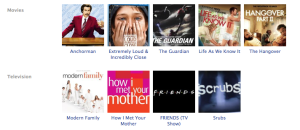By Matthew Gillis
Predicting the future of technology is like asking someone to fly to the moon; it’s nearly impossible, unless, of course, you’ve got genius connections. How can one predict something that literally changes from day-to-day?
If you’ve been keeping up with this blog, I think you understand that much of our daily lives depend upon technology. But more specifically, much of that technology involves the Internet, and I believe that future technology will too. Yes, I know what you’re thinking. That’s not a very groundbreaking prediction. However, I believe that even more aspects of our lives will be experienced online, from high school education to religious ceremonies.
 But, surprisingly, it isn’t the idea of spending our lives on the virtual reality of the Web that scares me. It’s the continual reduction of information used to communicate online that does. In my lifetime, I’ve seen the way that the Internet and the tools we use from it shape how we maintain relationships through communicating. Like many of my peers, I was introduced to social networking with the ever-popular MySpace, where I was able to have complete control over my profile design, bio, interests, music, and heroes, among other categories. Once MySpace wasn’t “cool” anymore, I migrated to Facebook, where control over my profile’s design was lost. Similarly, expressing interests and music on Facebook is limited to a single picture of the activity or musician, for example, of which you have no control over. Even between these two social networks, I’ve seen how communicating your public image online is depending on less and less information, from the use of lengthy bios to now displaying a row of “interest” picture icons.
But, surprisingly, it isn’t the idea of spending our lives on the virtual reality of the Web that scares me. It’s the continual reduction of information used to communicate online that does. In my lifetime, I’ve seen the way that the Internet and the tools we use from it shape how we maintain relationships through communicating. Like many of my peers, I was introduced to social networking with the ever-popular MySpace, where I was able to have complete control over my profile design, bio, interests, music, and heroes, among other categories. Once MySpace wasn’t “cool” anymore, I migrated to Facebook, where control over my profile’s design was lost. Similarly, expressing interests and music on Facebook is limited to a single picture of the activity or musician, for example, of which you have no control over. Even between these two social networks, I’ve seen how communicating your public image online is depending on less and less information, from the use of lengthy bios to now displaying a row of “interest” picture icons.
 It seems that visuals, such as Facebook’s icons, are replacing the extensive forms of communication. Just look at an iPhone. The rows of app icons replace text-based descriptions.
It seems that visuals, such as Facebook’s icons, are replacing the extensive forms of communication. Just look at an iPhone. The rows of app icons replace text-based descriptions.
I predict that the future of technology will be dependent on visuals rather than text. We may even be in the midst of this visual-focused future right now. Just look at the popularity of photo-sharing technologies such as Pinterest and Instagram. While I enjoy photography as a form of expression, I don’t think that pictures can replace text-based communication. Just as movies haven’t replaced books, I don’t think that photos can replace text. (I mean, who actually enjoys the movie version of a book over the book itself?)
But it’s more than just my personal opinion that leads me to this concern. Our current educational system is still based on the use of text as the primary form of communication. Until schools begin giving courses on how to interpret imagery as a form of communication and how to produce such images appropriately, the future of image-based technology is quite frightening.
I’ve said it before, and I’ll say it again: Just because you can take pictures, doesn’t mean you should.
______________________________________________________
Find me on Instagram: mattgillis


